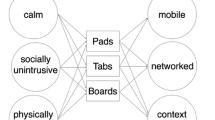Abstract
Design-oriented research is an act of collective imagining—a way in which we work together to bring about a future that lies slightly out of our grasp. In this paper, we examine the collective imagining of ubiquitous computing by bringing it into alignment with a related phenomenon, science fiction, in particular as imagined by a series of television shows that form part of the cultural backdrop for many members of the research community. A comparative reading of these fictional narratives highlights a series of themes that are also implicit in the research literature. We argue both that these themes are important considerations in the shaping of technological design and that an attention to the tropes of popular culture holds methodological value for ubiquitous computing.
Similar content being viewed by others
Notes
The 1980s also represent the period in which personal computing became a reality and in which Mark Weiser began ubicomp research at PARC.
The show was relaunched in 2005, and new episodes are produced in Britain and shown around the world. While many of our comments are relevant to both shows, it is the original in which we are especially interested, again because its of intersection with the emergence of the ubiquitous computing vision.
References
Adams D (1979) Hitch-hikers guide to the galaxy. Pan Books, London
Adams D (1980) Restaurant at the end of the universe. Ballantine, New York
Bell G, Dourish P (2007) Yesterday’s tomorrows: notes on ubiquitous computing’s dominant vision. Pers Ubiquitous Comput 11(2):133–143
Boulle P (1963) La planète des singes. René Julliard, Paris
Evangelista B (2004) Trek tech: 40 years since the enterprise’s inception, some of its science fiction gadgets are part of everyday life. San Francisco Chronicle, San Francisco
Fortes M, Evans-Pritchard E (eds) (1940) African political systems. Oxford University Press, Oxford
Greene E (1998) Planet of the apes as American myth: race, politics and popular culture. Wesleyan, Middleton
Gupta A (1995) Blurred boundaries: the discourse of corruption, the culture of politics and the imagined state. Am Ethnol 22(2):375–402
Hale C (1994) Resistance and contradiction: Miskuti Indians and the Nicaraguan state, 1894–1987. Stanford University Press, Stanford
Howe DJ, Walker SJ (1998) Doctor who: the television companion, 1st edn. BBC Books, London
Hopkinson N, Mehan U (eds) (2004) So long been dreaming: postcolonial science fiction and fantasy. Arsenal Pulp Press, Vancouver
Leach E (1959) Political systems of highland Burma. The Athlone Press, London
Marcus G (1995) Ethnography in/of the world system: the emergence of multi-sited ethnography. Annu Rev Anthropol 24:95–117
Muir JK (2000) A history and critical analysis of blake’s 7, the 1978–1981 British television space adventure. McFarland & Company, London
Nader L (1972) Up the anthropologist—perspectives gained from studying up. In: Hymes D (ed) Reinventing anthropology. Pantheon Books, New York, pp 284–311
Nunberg G (1993) The place of books in the age of electronic reproduction. Representations 42(Spring):13–37
Penley C (1997) NASA/TREK: popular science and sex in America. Verso, New York
Richards Justin (2003) Doctor who—the legend, 1st edn. BBC Books, London
Scott J (1985) Weapons of the weak: everyday forms of peasant rebellion. Yale University Press, Yale
Spitulnik D (1993) Anthropology and mass media. Annu Rev Anthropol 22:293–315
Starner T (2002) Wearable computers: no longer science fiction. IEEE Pervasive Comput 1(1):86–88
Stevens A, Moore F (2003) Liberation: the unofficial and unauthorised guide to Blake’s 7. Telos Publishing, Surrey
Stover LE (1973) Anthropology and science fiction. Curr Anthropol 14(4):471–474
Taussig Michael (1996) The magic of the state. Routledge, London
Thacker E (2001) The science fiction of technoscience: the politics of simulation and a challenge for new media art. Leonardo 34(2):155–158
Tsing A (1994) In the realm of the diamond queen. Stanford University Press, Stanford
Weinstein D (2002) Captain video: television’s first fantastic voyage—DuMont television network, cold war propaganda. J Pop Film Telev 29(3):148
Acknowledgments
This work was supported in part by the National Science Foundation under awards 0205724, 0527729, 0524033, and 0712890. We would like to thank several earlier readers for their feedback and encouragement, including Johanna Brewer, Bruce Sterling, and Amanda Williams.
Author information
Authors and Affiliations
Corresponding author
Rights and permissions
About this article
Cite this article
Dourish, P., Bell, G. “Resistance is futile”: reading science fiction alongside ubiquitous computing. Pers Ubiquit Comput 18, 769–778 (2014). https://doi.org/10.1007/s00779-013-0678-7
Received:
Accepted:
Published:
Issue Date:
DOI: https://doi.org/10.1007/s00779-013-0678-7




